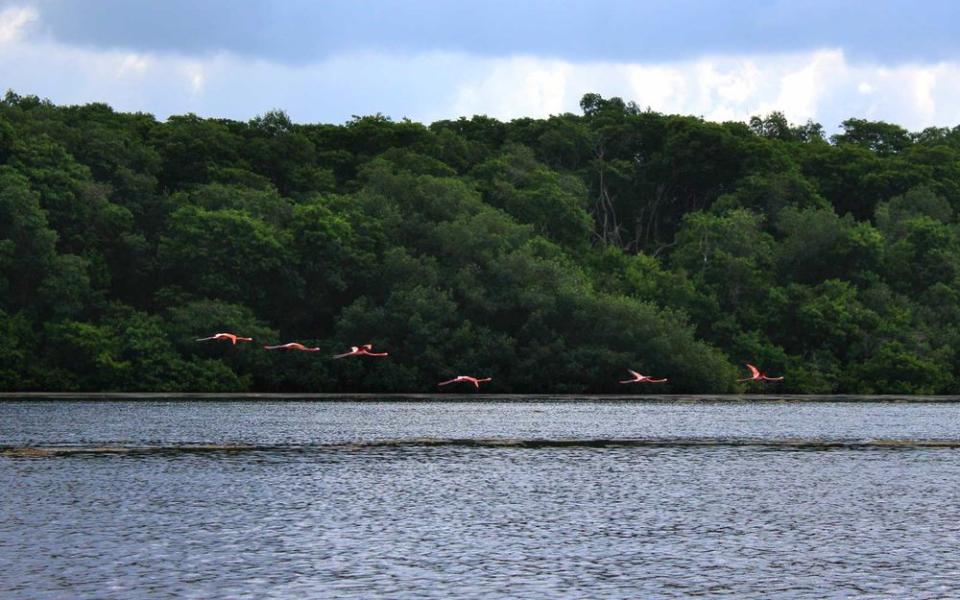Thousands of Pink Flamingos and Color-changing Mangrove Caves Turn This Quiet Mexican Town Into a Rainbow Dreamscape Every Year

There’s a different form of winter wonderland in Yucatan, Mexico, and it comes in pink. Every year during the fall and winter seasons thousands of flamingos settle in the beautiful Ecological Reserve of Celestún, which is only 64 miles southwest of Mérida. Although there’s a permanent colony of these birds all year, it’s from late November to early March that the waters of the estuary are filled with the eye-catching creatures.
The number of flamingos present varies from year to year, but some locals say they have seen up to 10,000 at a time. The reason behind this is that during the warmer months they fly to an area in Yucatán called Río Lagartos to have their babies, and then travel back to Celestún during winter with their young. All year the younger ones stay in this paradise, making sure birdwatchers have their dose of pink.

Although tourism to Celestún has grown since it was proclaimed a natural reserve, it has retained its charm as a small fishing town with friendly residents and beachfront eateries. A narrow road covered by dense vegetation that eventually transitions from pavement to dirt will take you to the core of the Celestún Estuary Biosphere Reserve (also known as Ría Celestún Biosphere Reserve). Although the road is unpaved — visitors’ first hint at the importance of keeping this place as natural as possible — it is easy enough to drive deeper into the park.
The only hotel in the reserve is called Xixim, and it was built over 20 years ago, before it was decreed a Natural Protected Area in 2000. The luxurious hotel is eco-friendly and even hosts workshops to teach locals how to care for the estuary and keep it clear of trash.
There are two ways to go birdwatching. Celestún only has one dock, where both fishermen and tour guides park their boats. Another way is to hire a private tour at the Xixim Hotel, where a local guide will drive the party to the dock, and then, in a boat, will go deep into the estuary, all the way to the flamingos’ eating site, and Bird Island, a spot in the stream where all types of birds gather. Whichever you prefer, navigating through the estuary is a nature lover’s dream come true. The water is crystal clear and there are lush red mangroves wherever you turn. There are over 300 different species of birds, but during winter the number rises, since Celestún is one of migratory birds’ favorite destinations. Herons, pelicans, albatross, vultures, and ducks are all regulars. Although birds are the main inhabitants, there are also jaguars, spider monkeys, and wild cats living in the area. Of course, there’s also plenty of aquatic life, including octopus, and a very unique type of shrimp that can only exist where freshwater meets saltwater.
Although the scene is idyllic, you might want to stay in the boat, since all of these animals are free to roam, including two species of crocodiles. Should you be yearning for a dip, however, 81,000 hectares of mangrove caves are filled with clear water that’s safe for swimming. During the rainy season the color of the water is an intense turquoise, and during the dry season a profound red, thanks to the secretion that gives red mangroves their name.
There’s also the opportunity to get into the water at Hotel Xixim’s secret beach. Xixim comes from a Mayan combination of words that means “remnants of seashells,” and the romantic name is a hint at what you’ll find. If you stand right where the gentle waves break, you’ll notice a unique sound: Just beneath the water’s surface there are thousands of small seashells dragged in from the ocean that chime like sleigh bells as they move with each wave.
Between the tranquil solitude, the warm sun, and the mesmerizing melody of the sea, you’ll most likely fall asleep on the hammocks hung along the beach. But don’t worry, the aroma of fresh seafood will wake you just in time for dinner.

